|
|
|
Sort Order |
|
|
|
Items / Page
|
|
|
|
|
|
|
| Srl | Item |
| 1 |
ID:
188707
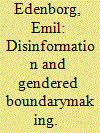

|
|
|
|
|
| Summary/Abstract |
This article examines how Russian geostrategic communication is entangled in global gender politics. The aim is to understand the resonance of disinformation in relation to culturalized, ethnicized and racialized narratives of gender, or “gendered boundarymaking.” The analysis is based on focus group discussions with Swedish, Danish, and Norwegian individuals, asked to share their impressions of news articles from the Russian media agency Sputnik, which all depicted Sweden as a warning example of multiculturalism and feminism gone “too far.” In the discussions, participants opposed a gender equal “self” to a patriarchal immigrant “other,” narrated Sweden as a country exceptionally concerned with gender, and tapped into competing temporalities of progress and decline. The article contributes to research on geostrategic communication by showing how disinformation efforts draw upon gendered national identities and debates about gender and immigration. More importantly, the article demonstrates that such gendered boundarymaking shapes audiences’ interpretations in crucial ways. Rather than viewing disinformation only from a state-centered lens of national security, in isolation from racism, Islamophobia, anti-feminism, and queerphobia within Western societies, research should acknowledge the interconnections between geostrategic communication and everyday boundarymaking. This will be pivotal to developing counterstrategies to disinformation, whether Russian or homegrown.
|
|
|
|
|
|
|
|
|
|
|
|
|
|
|
|
| 2 |
ID:
188705
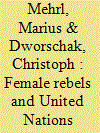

|
|
|
|
|
| Summary/Abstract |
How does the presence of female rebel combatants during conflict influence the likelihood of United Nations post-conflict peacekeeping deployment? While past literature on peacekeeping emphasizes the role of conflict attributes and security council interests, only few studies investigate the importance of belligerent characteristics. We argue that, because dominant gender stereotypes paint women as peaceful, female rebel combatants lead domestic and international audiences to perceive conflicts in which they fight as more severe. Given that recent UN resolutions and mission mandates align with these stereotypes, this in turn, causes the UN to intervene and deploy peacekeepers. Multivariate regression models drawing on a global sample of UN post-conflict missions provide empirical support for our hypothesis. Our findings add to the growing body of literature emphasizing the role of women in combat roles, and contribute to the discussion on the UN’s Women, Peace, and Security agenda.
|
|
|
|
|
|
|
|
|
|
|
|
|
|
|
|
| 3 |
ID:
188708
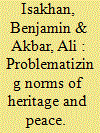

|
|
|
|
|
| Summary/Abstract |
The destruction of heritage in conflict has emerged as a key challenge to global security and the prospects of peace. In response to the deliberate targeting of heritage sites by the Islamic State (IS) and other actors in recent years, the international community has launched a number of initiatives designed to protect and reconstruct key heritage sites in complex (post-)conflict contexts. However, this article demonstrates that such initiatives are often underpinned by the norm that the protection of heritage in conflict can serve to enhance the prospects of reconciliation, stability and peace. This article problematizes this norm by focussing on the case study of Shia responses to the targeting of their religious heritage sites by the IS in Iraq from mid-2014. It documents the ways that key Shia leaders instrumentalized the case of protecting heritage not to advance peace and security, but to create entirely new militias, to recruit thousands of Shia faithful, to mobilize them to fight against the IS, and to engage in violence and human rights abuses. This raises significant concerns about whether the promotion of heritage as a pathway to peace could inadvertently exacerbate conflict and lead to renewed waves of violence and heritage destruction.
|
|
|
|
|
|
|
|
|
|
|
|
|
|
|
|
| 4 |
ID:
188703
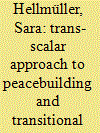

|
|
|
|
|
| Summary/Abstract |
Peace research has taken a local turn. Yet, conceptual ambiguities, risks of romanticization, and critiques of co-option of the “local” point to the need to look for novel ways to think about the interactions of actors ranging from the global to the local level. Gearoid Millar proposes a trans-scalar approach to peace based on a “consistency of purpose” and a “parity of esteem” for actors across scales. This article analyzes the concept of trans-scalarity in the peace process in Ituri, a province in the northeastern Democratic Republic of Congo (DRC). Drawing on qualitative data from more than a year of research in the DRC, I argue that while a trans-scalar approach was taken to end violence, it was not applied to transitional justice initiatives. The result was a negative, rather than a positive peace. By showing the high, but still untapped, potential of trans-scalarity, the article makes three contributions. First, it advances the debate on the local turn by adding empirical insights on trans-scalarity and further developing the concept’s theoretical foundations. Second, it provides novel empirical insights on the transitional justice process in the DRC. Third, it links scholarship on peacebuilding and transitional justice, which have often remained disconnected.
|
|
|
|
|
|
|
|
|
|
|
|
|
|
|
|
| 5 |
ID:
188706
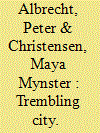

|
|
|
|
|
| Summary/Abstract |
While divided cities are characterized by spatially cemented segregation and polarized divisions, the trembling city is organized around transient and transformative borders. We conceptualize this notion of urban space to capture Freetown’s war-peace transition in the late 1990s and early 2000s. Ex-combatants settled on the city margins, bringing with them spatial strategies from war-fighting into the city by recreating a system of bases. The Sierra Leone Police (SLP) re-emerged with external support, seeking to compartmentalize and fixate Freetown through a combination of force and negotiation. We use borders and bordering to understand policing as attempts by both ex-combatants and the SLP to border in as well as out; defensively against external interference and offensively to make territorial claims. By extension, it is tensions in these practices between attempts to defend and harden borders, and at the same time, expand and soften them that trigger a tremble. The city tremble was a reminder of the possibility of war that Freetown very easily could return to. It also became a more general and inconspicuous condition of the city as an inhabited space, where multiple and often incompatible and conflictual spatial logics, strategies, and practices of policing clashed, overlapped and co-existed uneasily.
|
|
|
|
|
|
|
|
|
|
|
|
|
|
|
|
| 6 |
ID:
188704


|
|
|
|
|
| Summary/Abstract |
The performance of individual international organizations (IOs) has received considerable scholarly attention, not in the least because their importance for global governance. This paper adds to this body of work by adopting genuine comparative lenses. Based on a novel survey, it assesses the attributed performance of 49 IOs over two important dimensions: problem-solving effectiveness and legitimacy of outputs. This reveals variation between IOs with respect to both components. We derive hypotheses from international cooperation and IO design. The quantitative analysis reveals that except deliberative diplomatic practices many factors increasing attributed legitimacy differ from the ones increasing the attributed problem-solving effectiveness. Most notably, autonomous secretariats increase the problem-solving effectiveness attributed to IOs. Legitimacy attributions increase when IOs are regional instead of global in nature and when non-state actors have access to IO decision-making.
|
|
|
|
|
|
|
|
|
|
|
|
|
|
|
|
|
|
|
|
|